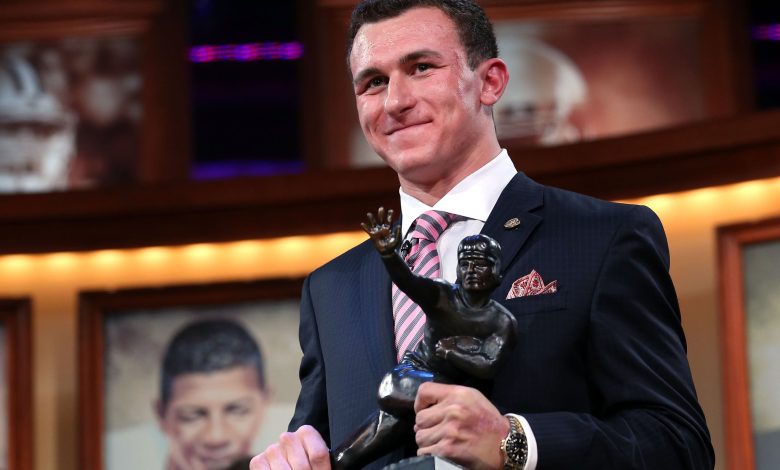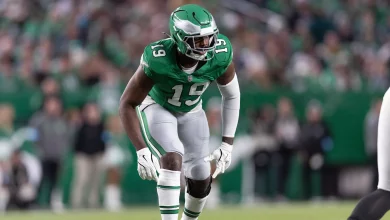The greatest college football player in history is named by Texas A&M great Johnny Manziel.

The Greatest College Football Player in History is Named by Texas A&M Great Johnny Manziel
In the ever-evolving world of college football, debates about who deserves the title of the greatest college football player in history are as endless as they are passionate. Fans, analysts, and former players often offer their opinions, with names like Tim Tebow, Bo Jackson, Peyton Manning, and Barry Sanders frequently being mentioned. But when Johnny Manziel, one of the most dynamic players in recent college football history and a Texas A&M legend, weighs in on this debate, his voice carries significant weight. As a former Heisman Trophy winner and the face of Aggie football during his iconic college career, Manziel’s perspective on this topic is intriguing and invaluable.
Manziel’s time at Texas A&M was nothing short of historic, as he became the first freshman to win the Heisman Trophy in 2012 and led the Aggies to one of their most successful seasons in program history. Known for his incredible playmaking ability, electrifying style, and resilience under pressure, Manziel’s legacy in the college football landscape is undeniable. His candidacy for the greatest college football player ever, however, is complicated by the presence of other all-time greats who, like him, shaped the game in profound ways.
When asked to name the greatest college football player of all time, Manziel, with his distinctive confidence and insight, didn’t hesitate. He named Bo Jackson, the former Auburn University running back, as the player who stood above the rest. Manziel’s reasoning for this choice is rooted not only in Jackson’s legendary college football career but also in the incredible impact Jackson made across multiple sports. Jackson’s combination of sheer athleticism, dominance on the field, and versatility is what makes him, in Manziel’s eyes, the greatest to ever play the game.
But what makes this discussion so compelling is not just Manziel’s choice, but the larger conversation it sparks about what it means to be the greatest in college football. Is it about statistical dominance? Championship success? Or perhaps it’s the ability to transcend the sport itself? As we explore Manziel’s reasoning and the broader context of the “greatest college football player” debate, we’ll also reflect on the incredible legacy left by both Jackson and Manziel — two athletes who, in their own right, redefined what it meant to be a college football star.
Bo Jackson: The Choice of Johnny Manziel
Bo Jackson’s name is synonymous with greatness in both college football and professional sports. A standout at Auburn University, Jackson was a two-sport athlete, excelling in both football and baseball. His combination of speed, strength, and natural talent was unparalleled in the college football world. Jackson’s 1985 season at Auburn, where he rushed for over 1,700 yards and scored 17 touchdowns, remains one of the most impressive individual performances in the sport’s history.
Jackson’s college football career was remarkable not only for his on-field dominance but also for his dual-sport success. He played football and baseball simultaneously, showcasing his extraordinary athletic ability. In fact, Jackson famously played in the NFL for the Los Angeles Raiders while also playing Major League Baseball for the Kansas City Royals, proving that his greatness extended beyond the football field. This rare versatility is part of the reason why Johnny Manziel named Jackson the greatest of all time. While Jackson was dominant on the field, he also carved out a path that few other athletes could replicate, showing that greatness could transcend a single sport.
For Manziel, Jackson’s accomplishments were about more than just football. Jackson didn’t simply dominate on the gridiron; he did so with a level of athleticism and charisma that captivated fans. Jackson’s larger-than-life persona made him a household name, and his ability to excel in two of the country’s most popular sports at the highest level added a layer of mystique to his career. Even today, his iconic Monday Night Football run — where he broke multiple tackles and outran defenders for a touchdown — is often considered one of the greatest plays in the history of the NFL.
Johnny Manziel: A Legend in His Own Right
While Johnny Manziel’s pick of Bo Jackson is one that carries weight, it’s important to examine the man behind the opinion — a player whose own college career left an indelible mark on college football.
Manziel’s time at Texas A&M was a spectacle. Arriving as a freshman in 2012, he quickly became a sensation, leading the Aggies to an 11-2 record in their first season in the SEC. In doing so, he became the first freshman to win the Heisman Trophy, a feat that cemented his place in college football history. His ability to make incredible plays, both with his arm and his legs, made him a nightmare for opposing defenses. Whether it was his ability to escape pressure, his improvisational style, or his deep-ball accuracy, Manziel’s skills were unmatched in many ways.
In his sophomore season, Manziel followed up his Heisman performance by leading Texas A&M to another strong campaign, finishing with a 9-4 record and earning SEC Offensive Player of the Year honors. His ability to elevate his game in high-pressure situations was evident, as he led the Aggies to signature wins, including a thrilling victory over the Alabama Crimson Tide in Tuscaloosa — a win that solidified his status as one of the most dynamic quarterbacks in college football history.
Manziel’s playmaking ability was not just about statistics — it was about his ability to change the game in the blink of an eye. Whether it was a dazzling 50-yard touchdown run or a pinpoint throw on the run, Manziel’s talent was evident every time he took the field. He finished his college career with over 7,800 passing yards, 2,000 rushing yards, and 93 total touchdowns, a testament to his multifaceted skills. But what truly set him apart was his natural charisma and the way he captivated fans and opponents alike.
Manziel’s legacy at Texas A&M is one of a player who brought excitement and relevance back to the program. Under his leadership, the Aggies became one of the most talked-about teams in the country. Fans flocked to Kyle Field, and television ratings soared as Manziel became a household name. Even after his departure, his impact on the program remains significant. His name is synonymous with Texas A&M football, and his daring style of play has influenced a new generation of quarterbacks.
The Debate: What Makes the Greatest College Football Player?
Johnny Manziel’s choice of Bo Jackson as the greatest college football player ever certainly carries weight, but what does it really mean to be the greatest? For many, the definition of greatness in college football is subjective, based on a variety of criteria. Some might argue that the greatest player is one with the most championships or the one who set the most records. Others, however, might place a greater emphasis on the player’s ability to change the course of a game and their impact on the sport itself.
Statistical Domination: One way to measure greatness is through individual statistics. Players like Tim Tebow and Derrick Henry set records during their college careers, dominating at their positions in ways that few others ever have. For instance, Tebow’s career passing touchdowns (88) and rushing touchdowns (57) are among the most impressive in college football history. Similarly, Henry’s 2,219 rushing yards and 28 touchdowns during his Heisman-winning season are unmatched in recent memory.
Championship Success: Another criterion for greatness is championships. While Jackson and Manziel didn’t win national championships during their college careers, other players like Joe Burrow and Vince Young did, with Burrow leading LSU to a national title and a historic individual season, and Young’s heroics against USC in the 2005 national championship game solidifying his place in college football lore.
Impact on the Game: Ultimately, greatness can also be measured by a player’s impact on the game — how they transcend their sport and how their legacy endures. In this regard, Jackson’s ability to excel in both football and baseball, and Manziel’s ability to revolutionize the quarterback position with his dual-threat capabilities, place both players in rare company.









